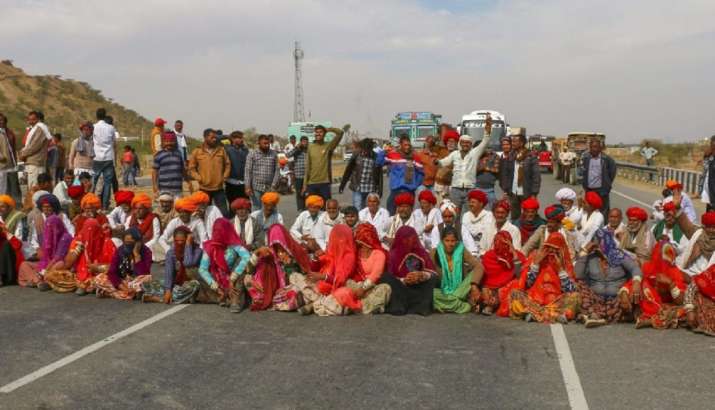
Gujjars back to agitation mode in Rajasthan demanding promised quota
The Gujjar community in Rajasthan is back in agitation mode: on Monday (November 2) they blocked the rail route in the state’s Bharatpur as part of their agitation demanding reservation in jobs and education.

The Gujjar community in Rajasthan is back in agitation mode: on Monday (November 2) they blocked the rail route in the state’s Bharatpur as part of their agitation demanding reservation in jobs and education.
More than a dozen trains have been diverted on the Delhi-Mumbai route and the bus service on the Agra-Jaipur route has been halted as a precautionary measure.
The community, which has been demanding reservation as a ‘most backward class’ (MBC) community, said its agitation will continue till its demands are met.
“We will continue our agitation until our demands are met and an order is issued by the government. The youth from our community are unemployed, 25,000 jobs are stuck and nobody is talking about our problems,” Gujjar leader Vijay Bainsla said.
Seven trains were diverted due to a blocking of the railway line on the Hindaun City-Bayana route, the Western Railway said on Sunday night. The diverted trains include Hazrat Nizamuddin-Kota, Bandra Terminus-Muzaffarpur, Kota-Dehradun, Indore-Hazrat Nizamuddin, Hazrat Nizamuddin-Indore, Hazrat Nizamuddin-Udaipur and Udaipur-Hazrat Nizamuddin.
Also read: Marathas want reservation under SEBC, not OBC category: BJP MP
Reports claimed that mobile internet services have been suspended in many districts.
The Gujjar Aarakshan Sangarsh Samiti headed by Col KS Bainsla Samiti had a fortnight ago given an ultimatum to the Gehlot government that it would re-start its agitation if all demands were not met by Nov 1.
Gehlot govt in a bind
A subcommittee of ministers of the state cabinet has taken up three key demands raised by the Gujjar Samiti. A few days back, two ministers, Ashok Chandna and Dr Raghu Sharma, held a joint press conference and said the government was committed to uplifting the Most Backward Classes or MBC category to which the Gujjars belong.
‘‘In the past two years, over 2,400 jobs have been given to the Gujjar youth and all the 1,252 candidates belonging to the MBC who have completed their probation will be given ‘regular pay scale’ by the state government on completion of their probationary period,’’ said Chandna, the Sports Minister.
In addition, the Gehlot government will again write to the Centre to include MBC reservation in the Ninth Schedule. Along with this, minister Chandna said that families of the three people who were injured during past Gujjar agitations and died in later years, will be given an assistance of Rs 5 lakh each by the state government.
Old demands
The Gujjars are a predominant caste along with the Meenas in southern Rajasthan. Their agitation is as old as 2007. It has resulted in violence and disruption of essential services in 2008, 2010 and in 2015. As many as 72 Gujjars have so far died in police firing during the quota agitation.
The community is mostly into farming and trading and is classified by the government as an ‘Other Backward Class’. The community feels it has been economically and educationally left behind and it wants to be reclassified as a Scheduled Tribe.
The state government, however, has so far declined to change their status. Instead, it has announced several financial and administrative measures, but community leaders have said that they “do not want money”. Col Bainsla has repeatedly said: “We do not accept the economic package.”
The quota puzzle
Currently, they can avail 1% reservation under the most backward class (MBC) category apart from the benefit of OBC reservation. Reservation in the state stands at 50% – 16% to SC, 12% to ST, 21% to OBC and 1% to Gujjars.
Gujjars, along with nomadic communities, were given 1% quota in the “most-backward” category, in addition to the OBC benefit, in 2010.
The state government has tried thrice in the past to give 5% reservation to Gujjars as a ‘Special Backward Class,’ but the legislation was struck down every time by the Rajasthan High Court, which ruled that the quota had not only exceeded the 50% limit, but was also not supported by quantifiable data.
In early 2019, the newly elected Congress government passed a Bill in the Assembly, giving 5% reservation to Gujjars and four other nomadic communities as an ‘Extremely Backward Class’ and made a “recommendation” to the Centre that the legislation be included in the Ninth Schedule of the Constitution to protect it from being challenged in courts.
This has resulted in the quota exceeding the 50% limit. The Bill, which amended an Act of 2017, made a mention of the Constitution Amendment Bill passed by the Union government to extend quota to the poor, which breached the 50% ceiling. The 10% reservation for the poor in the general category introduced by the Centre has also been implemented in Rajasthan, taking the total quota to 64%.
On April 5, 2019, the Supreme Court refused to entertain a plea challenging the grant of 5% quota to Gujjars and four other castes in jobs and educational institutions in Rajasthan through an amendment.
A bench headed by Chief Justice Ranjan Gogoi dismissed the appeal filed by Arvind Sharma against a Rajasthan High Court order refusing to grant interim relief on the petition challenging the quota to Gujjars and others, treating them as socially and economically backward classes.
It was argued that the reservation would breach the 50% ceiling on total quantum of quota.
“The plea for relief is already pending in High Court, therefore, we are not inclined to entertain it,” said the Bench comprising Justices Deepak Gupta and Sanjiv Khanna.

